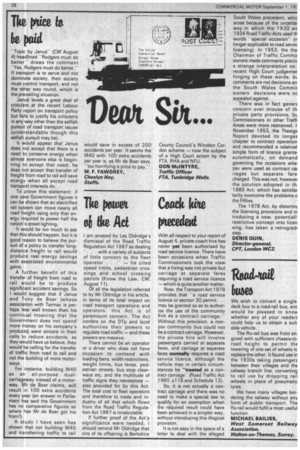Cowl, kike With all respect to your report of August
Page 28

If you've noticed an error in this article please click here to report it so we can fix it.
4, private coach hire has never yet been authorised by road service licence. There have been occasions when Traffic Commissioners took the view that a hiring was not private but carriage at separate fares requiring a road service licence — which is quite another matter.
Now, the Transport Act 1978 provides that "a road service licence or section 30 permit . may be granted so as to authorise the use of the community bus as a contract carriage." Without this provision, a nonpsv community bus could not be a contract carriage. However, the private hire will involve passengers carried at separate fares, and carriage at separate fares normally requires a road service licence, although the vehicle may in certain circumstances be "treated as a contract carriage" (Road Traffic Act 1960, s118 and Schedule 12).
So, it is not actually a contract carriage and there was no need to make a special law to qualify for an exemption when the required result could have been achieved in a simpler way, without introducing this illogical provision.
It is not easy in the space of a letter to deal with the alleged South Wales precedent, whic arose because of the uncertai way in which the 1930 an 1934 Road Traffic Acts used th words "special occasion" (n longer applicable to road servic licensing). In 1953, the the Chairman of Traffic Commit sioners made comments placin a strange interpretation on recent High Court juclgemer hinging on these words; bL comments are not decisions an the South Wales Commit sioners' decisions were nc appealed against.
There was in fact genera concern over misuse of th private party provisions, bL Commissioners in other Traffi Areas were more restrained. I November 1953, the ThesigE Report devoted its longes chapter to contract operation and recommended a relativel simple form of licence grant& automatically, on demand governing the occasions whei psv were used as contract car riages but separate fare charged. This was not, however the solution adopted in th 1960 Act, which has satisfac torily overcome the problems o the Fifties.
The 1978 Act, by distortini the licensing provisions and in troducing a new, potentiall' restrictive concept into licen sing, has taken a retrogradi step.
DENIS QUIN, Director-general, CPT, London WC2.




































































































